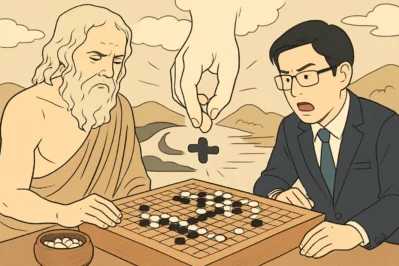Debating History in Korean: From Augustine to Modern Seoul
Hello! It’s your favorite Korean language booster, Maeil Hangeul (매일한글), here to upgrade your skills!
Today, we’re diving deep—really deep—into the world of philosophy and history. We’ll be exploring concepts from Augustine’s masterpiece, The City of God, and learning the advanced Korean vocabulary needed to discuss them. You might be thinking, “Medieval philosophy? How is that useful?” Well, lately in Korea, there’s a fascinating trend of public intellectuals and commentators using historical and philosophical frameworks to analyze everything from politics to the plots of hit K-dramas. Understanding this high-level discourse is your key to unlocking true fluency. Let’s get started!
Core Expressions for Philosophical Debate
Here are the key terms you need to sound like a seasoned intellectual when discussing history and society in Korean.
1. 섭리 (Seop-ri)
- Pronunciation: [Seop-ri]
- English Meaning: Providence; a divine plan or guidance.
- Detailed Explanation: This is a noun with profound theological and philosophical weight. It refers to the idea that history isn’t random but is guided by a higher power (like God) or a grand cosmic principle. While it has religious origins, in modern secular contexts, it can be used to describe an almost inescapable, fate-like force that guides events. It’s a very formal and literary word.
- Example: 역사의 섭리 (yeoksa-ui seop-ri) – the providence of history.
2. 목적론적 (Mok-jeok-ron-jeok)
- Pronunciation: [Mok-jjeok-ron-jeok]
- English Meaning: Teleological; related to the idea that everything has an ultimate purpose or goal.
- Detailed Explanation: This is a crucial adjective in academic discussions. It comes from 목적 (mok-jeok) meaning ‘purpose’ and 론 (ron) meaning ‘theory’. A 목적론적 관점 (mok-jeok-ron-jeok gwan-jeom) is a ‘teleological perspective’—viewing events not just by their causes, but by the final goal they are moving toward. Augustine’s philosophy of history is a prime example of this.
- Example: 목적론적 역사관 (mok-jeok-ron-jeok yeoksa-gwan) – a teleological view of history.
3. 이원론적 (I-won-ron-jeok)
- Pronunciation: [I-won-ron-jeok]
- English Meaning: Dualistic; based on two opposing principles.
- Detailed Explanation: From 이원 (iwon) meaning ‘duality’ or ‘two elements’. This adjective describes a worldview that sees reality as a struggle between two fundamental, opposing forces, like good vs. evil, mind vs. body, or in Augustine’s case, the City of God vs. the City of Man. It’s a key term in philosophy, religion, and even literary analysis.
- Example: 이원론적 세계관 (i-won-ron-jeok segye-gwan) – a dualistic worldview.
4. -을/를 고찰하다 (-eul/reul go-chal-ha-da)
- Pronunciation: [Go-chal-ha-da]
- English Meaning: To contemplate; to examine closely and thoughtfully.
- Detailed Explanation: This is a formal verb that signifies a much deeper level of thinking than simply ‘생각하다’ (to think). You use 고찰하다 when you are seriously investigating or reflecting upon a complex issue, such as a philosophical problem, a historical event, or a social phenomenon. It’s perfect for academic essays and formal debates.
- Example: 우리는 그 사건의 역사적 의미를 고찰해야 한다. (Urineun geu sageon-ui yeoksajeok uimi-reul go-chal-haeya handa.) – We must contemplate the historical meaning of that event.
Example Dialogue: Analyzing a K-Drama
Let’s see how these words might appear in a real conversation about a popular (fictional) historical drama.
A: “The finale of ‘Empire of Shadows’ was so bleak. I’m not sure I liked it.”
(‘그림자 제국’ 마지막 회는 너무 암울했어요. 마음에 들었는지 잘 모르겠네요.)
B: “I see what you mean, but I think the director was aiming for a 목적론적 narrative. The protagonist’s failure wasn’t the point.”
(무슨 말인지 알지만, 제 생각에 감독은 목적론적 서사를 의도한 것 같아요. 주인공의 실패가 핵심이 아니었죠.)
A:






